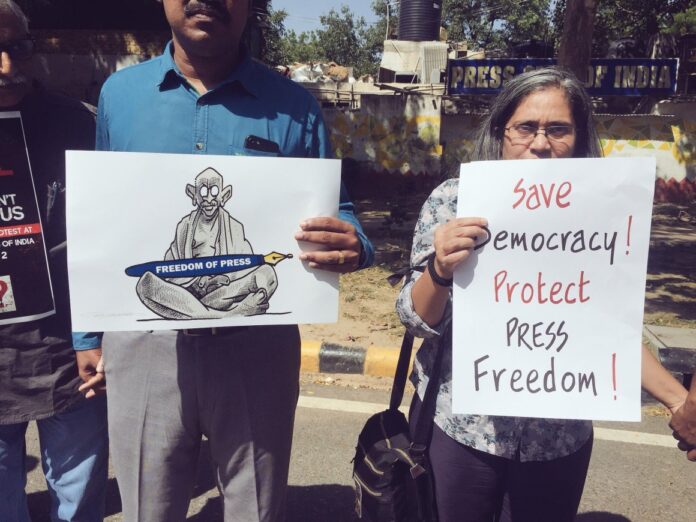On the eve of the World Press Freedom Day, the National Alliance of Journalists (NAJ) and the Delhi Union of Journalists has expressed shock and anger at increasing attacks on the media in the past year and demanded that a law be immediately enacted to protect media persons from arbitrary arrests and prosecutions. They have also demanded a broad based Media Council to replace the toothless Press Council.
“On the eve of the World Press Freedom Day we celebrate the vibrant voices of the many journalists, young and old, who stand up boldly for free speech in the face of attacks from all quarters. We face multiple challenges today from open fascism, rampant communalism, administrative and police excesses including jailing of journalists, false cases, raids, internet shutdowns, spyware, increasing moves to ‘regulate’ digital social media, trolling, widespread sexism and abuse, besides job losses and the dismantling of labour laws. Endless judicial delays deny us justice for years together. Yet many intrepid media persons carry on speaking truth to power,” the statement said.
Many in media who bring infamy
“Regrettably, there are also many in the media who bring infamy to the profession by acting as drumbeaters for the powers that be. Media barons have colluded in this process, hiring pliant ‘journalists’
whose nightly antics on television have destroyed the credibility of the medium. Hate speech and fake are the order of the day.
“The number of attacks on journalists who do not toe the line has increased sharply. Reporters Sans Frontieres’ World Press Freedom Index for 2021 had lowered India’s ranking to 142. The government
continues to imprison journalists under draconian Acts like UAPA. A colonial era Sedition law is still on the statute books and many journalists have been charged with sedition for offences such as a tweet or facebook post. During the Covid lockdown media persons braved the pandemic to report from the ground, yet some were arrested for reporting on lapses by public hospitals or corruption in hospital
supplies. Recently, journalists were paraded in their underwear in a police station. Others were arrested for exposing an examination scandal and spent three weeks in jail until concerted protests ensured their
release on bail,” the press release complained.
“Trolling has become a professional hazard, with no moves to curb organised, vicious abuse and threats on social media. Minority journalists face some of the worst hate speech. Women journalists are
repeatedly targeted with sexist abuse and threats of rape. We condemn the inaction on the Sulli Deals episode which led to further targeting of politically active women including leading journalists under the
Bulli Deals. We demand swift, deterrent punishment in all such cases,” said the NAJ and Delhi Union of Journalists.
Internet shutdowns
India holds a world record in the number of internet shutdowns. The digital rights group Access Now calculates that Indian authorities shut down the internet at least 106 times in 2021. India was followed by
Myanmar which had 15 disruptions. Internet shutdowns impede the work of journalists who cannot check the veracity of news and/or send out their stories on time. Meanwhile surveillance of the media is on the
rise, with spyware like Pegasus being used for dubious purposes.
Government policies have in recent years led to the devaluation of the news agencies, particularly UNI, as well as the neglect of the Urdu press. The result is job losses and in some cases suicide by desperate
employees. Meanwhile inaction against cross-media monopolies is ensuring that a few big players thrive in the media space at the expense of the rest.
Fast track courts needed
Approximately 3,000 journalists lost their jobs in the lockdown during the first wave of Covid 19. Many of them were pushed towards poverty. Legal challenges to some retrenchments are pending in the courts but will take years to yield results. There need to be fast track courts to decide such labour matters.
Instead of alleviating our plight, the government has virtually demolished the Working Journalists Acts that provided some protection and mandated a periodic wage board for the profession. We demand a
permanent wage fixation machinery for the entire media industry. We also demand that the anti-labour codes affecting the entire working classes besides journalists go lock, stock and barrel. No data is currently available on the number of journalists who have succumbed to Covid, although a few families have received some compensation. The government must collate and release this data.
Media Council demanded
Despite the many problems the profession faces today, even the post of Chairperson of the Press Council has been vacant for almost a year. The government has not cared to widen the scope of the Council to include all news media today. The NAJ-DUJ demand that besides an enlarged and empowered Media Council, the government should set up a Media Commission, The Commission must have experts to examine and make recommendations for the entire media spectrum, similar to the First and Second Press Commissions that were set up when the emergent media and new monopolies and interests were less conspicuous.
Independent media persons who have managed to create alternative employment through digital media are facing government pressures to control, censor and finish all forms of digital media. This is a looming
threat, the NAJ-DUJ warned, as the reach and popularity of the new media is growing by the day.




